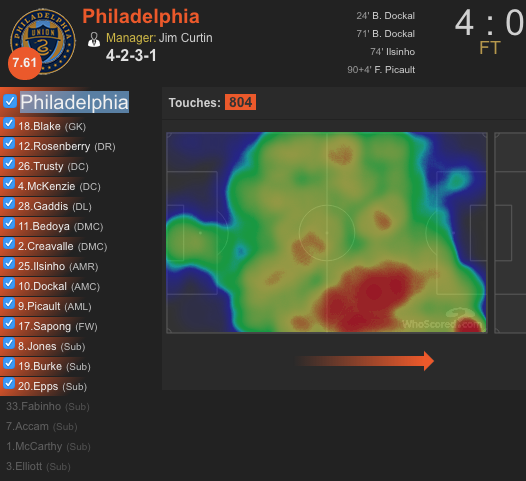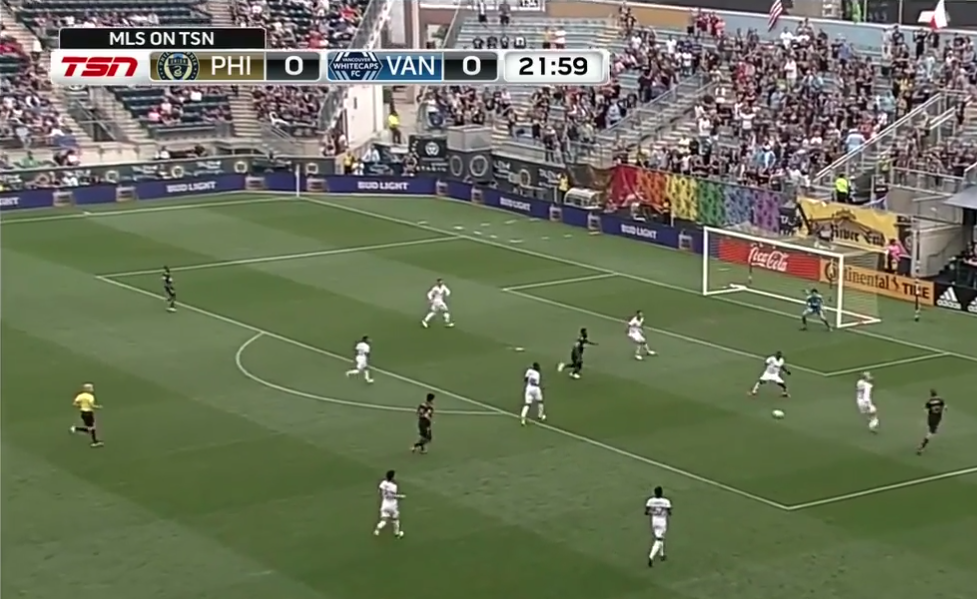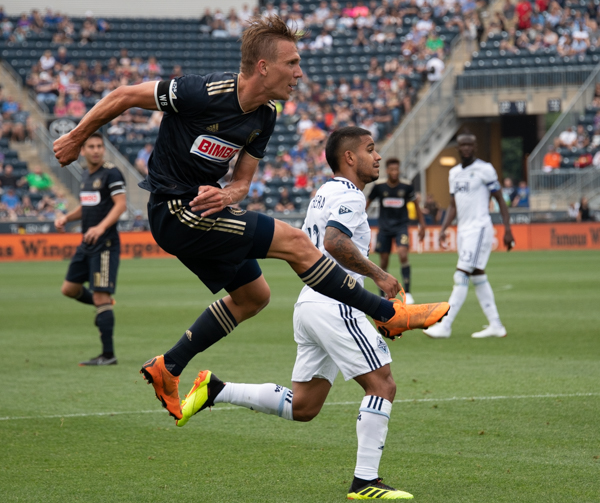Photo by Earl Gardner
The problem of God is one that is a classic trilemma. Most well-known in the form that originates from the Greek philosopher Epicurus and his “Problem of Evil,” the thought process goes something like:
If God is unable to prevent evil, then he is not all-powerful. If God is unwilling to prevent evil, then he is not all-good. If God is both willing and able to prevent evil and does not, then why does evil exist?
This kind of question (with lower stakes, perhaps, though maybe not) exists in classrooms, boardrooms, family rooms, and locker rooms all over the world. It has existed for the Philadelphia Union for years, manifesting itself again in 2018.
If the coach is unable to teach his players stop his opponents from scoring, then he is not in control. If the coach is unwilling to give his team their best chance of scoring goals of their own, then he is not all-good. If the coach is both willing and able to maximize his team’s chances of success and they do not succeed, what’s the point of having him as a coach?
Ready, willing, able,… and successful
The Philadelphia Union put together one of their most comprehensive performances in history on Saturday. A 4-0 scoreline is the obvious headline, but a 25-2 shot ratio, 60% of possession, and 606 total passes with 90% accuracy are highly notable as well.
A few specific things stood out that spoke directly to coaching, three in favor of a benevolent deity and one… that leaves one to wonder about His plan.
First, Vancouver wingers Cristian Techera and Alphonso Davies, known for their counterattacking guile and general disruptiveness (the young Davies is the team’s best player in 2018, according to WhoScored.com), were rendered so ineffective by the high line and high press of Union fullbacks Keegan Rosenberry and Ray Gaddis that both were substituted at halftime.
Second, the Union noticed immediately the exact thing Dave Leno and Tommy Smyth commented on around the 6th minute: “Brek Shea is not really a defender.” Considering he was playing Left Back (and has for quite some time, perhaps since the fateful day in which Union commentator Matt Cassel “injured American hero Brek Shea” and received “boos from his own fans“), this tactical question proved problematic for the Whitecaps. The Boys in Blue camped out on the right side of their attacking shape (shown below), with Borek Dockal and Alejandro Bedoya shading even more that way than usual so that Ilsinho and Keegan Rosenberry could link passes with them and dance circles around the British Columbians.
Three of the Union’s four goals originated from the right side, so the strategy seemed to have worked.

Third, Curtin did some in-game, real time, on-field coaching in the second half the likes of which Union fans have never seen. Having just won his game-long psychological battle with Vancouver forward Yordy Reyna, seeing him sent off for a childish 94th minute tackle in the box, Fafa Picault earned himself another yeoman’s award for effort and the team’s second penalty of the afternoon. Opportunistic striker, Corey Burke, found himself with a quick and easy chance to write his name on the score sheet, picked up the ball while Picault was still recovering from his foul, waved off the winger when Fafa realized what was about to transpire, and readied himself to take the team’s second penalty of the match.
Jim Curtin relayed a message from the bench that the penalty was deservedly Picault’s, took Burke off the ball, and allowed the winger a chance to place a cherry atop his sumptuous hard work sunday, already smothered in elbow grease (an acquired taste, to be sure).
Picault made no mistake, rewarding his coach’s loyalty and sense for the moment. Contrasted with the debacle that took place last season between C.J. Sapong and Roland Alberg over a penalty against Columbus (the public catalyst to the departure of the Dutchman), it was a masterstroke.
Involved, but fallible
C.J. Sapong started the match for the Union. This despite a season in which Sapong, a lone striker in the team’s evergreen 4-2-3-1, has only registered one shot on goal for every 115.4 minutes of match time (that is not a typo). In his only shot on goal in this particular match, he had space and a perfectly weighted ball from the right side via Man of the Match, Borek Dockal.

The question isn’t whether Sapong should have finished or not. “To finish or not to finish” is too binary a statement in a game of spheroids and infinite outcomes like soccer, no chance is a perfect chance, and Jose Aja was quick to close the Union striker down. The question is whether Corey Burke, Jay Simpson, or any other striker in the league right now would have done more with the chance than a slowly rolled redirection squarely sent to Whitecaps keeper, Brian Rowe.
The answer is this: any of that long list might have done better, and any striker hoping to keep his place in the 18 must do so. Though sticking with a laboring player as he plays through a slump against a team for which you’ve created a divine plan is noble and potentially prescient, Sapong was never really involved in the match despite completing 90% of his passes, winning more aerials than any of his teammates, and rating more highly than any player on the opposing team.
Frankly, Sapong was fortunate to get second half minutes at all considering Vancouver’s double switch. Worse, the moment his backup entered the match, the brief spell in which Vancouver changed their philosophy and regained their footing evaporated quickly into the Chester air, replaced instead by a trio of Union goals, one of which was a penalty the aforementioned backup earned.
Summary
It’s hard to argue that the Union are a good team yet. It’s hard to argue they’re bad, either. Catching their next opponents, LAFC, without Carlos Vela (away on World Cup duty) is about as fortuitous a west coast trip as possible. Then, they’ll match wits against league darlings, Atlanta United, with a certain defensive midfielder back in the fold, ready to right the wrongs done to him. A chance for personal atonement, perhaps.
Union fans have blisters on their palms from the amount of hand-wringing they’ve done about league full of LAs and Atlantas, debutant clubs who spend money and push the development of this domestic competition into it’s third phase. However, if the league keeps getting better, making every point more difficult to earn, then every day the Union maintain their point total year over year is a day they’re not quite being left behind.
With so much season in the rearview mirror and so much more ahead, at least for today the Union are a playoff team.


It’s a team that is playing a lot better over the last couple of months than they were early in the season. Yes, they had the setbacks in Atlanta and against Toronto, but I think they are headed in the right direction towards improving on 42 points (plus I’m not sure we can assume that they will leave LA empty handed).
.
One worry for me is the fact that while this team is gelling now they’ll need to start again from scratch next year at the number 10 unless Fontana is ready to take over the load full time. (I would say they need to try to pursue buying Dockal outright, but given that he is owned by a Chinese team, the tariff might be too high.)
Curtin rarely comes off as a tactical genius but somebody on the staff clearly whipped up a new-ish gameplan this time. I was particularly interested in Bedoya frequently dropping back into the right back slot when Rosenberry went on overlapping runs. I don’t remember seeing much of that before. Medunjanin drops back in between the center backs when we have the ball a lot. The pressure the combination of Ilsinho, Rosenberry, Dockal, and Bedoya were getting on the right was amazing.
.
This game makes me wonder if Creavalle is actually better in the starting lineup than Medunjanin. The skill gap with the ball is obviously enormous but Creavalle plays strong defense and has athletic ability and quickness. Those aren’t things Medunjanin brings to the table and it might really help to have Creavalle in there in front of the young back line.
I think Curtin is like anyone learning on the job, he just finished his degree effectively Dec 2016 (U.S. Soccer Pro License Coaching Course.)
–
Maybe:
* like anyone he is learning from his mistakes,
* has options personnel wise that he knows how to use,
* learned something from Earnie
* maybe it is (Dick Schreuder)
–
The past two years, there always appeared to be a decent enough plan starting out. It was in game adjustments that could have cost him. Thinking to college football, it always seamed that Paterno had great game plans, where others like say Franklin make better in game adjustments.
The Union do little changes each game. This game they clearly intended to attack up the right hard. To help relieve the counter problem Vancouver possess they allowed Bedoya to drop back as you said, allowing Roseneberry to bomb forward and rely on Bedoya’s experience to determine when to join the attack and when to sit back. Tweaks like this have been happening since Curtin took over. I’m sure the whole staff gets together to create the game plan but lets not pretend this is a one off. Granted it worked to perfection, but others in the past have too (sometimes with blowouts, usually with a ton of good chances our attackers don’t convert on).
I sit a couple rows back from the Union bench. When Curtin realized what Burke was doing and sent in the message for Fafa to take the pk, he turned to his assistants and said jokingly, “Guaranteed miss. He’s going to hit it high. You know that’s going to happen.” They all laughed, but it’s nice to be in a position in a game where you can joke about that as opposed to being in a spot where points depend on that kick.
Great observation. 🙂